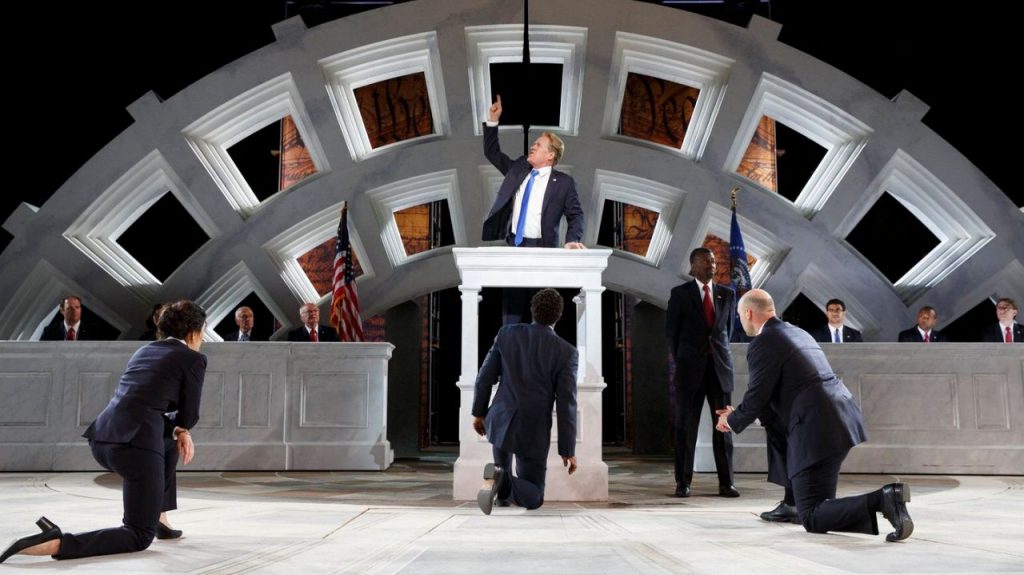6.30 David Frum in The Atlantic: “The ACA needs a replacement funding stream that yields more revenue and that taxes more broadly. This was the deal that Republicans should have demanded in 2009-2010. It will be harder to achieve today (because with ACA an accomplished fact Republicans now have less to trade), but it still should be their goal. One way to achieve that more difficult goal is to propose funding streams that are not only larger than the surtaxes on high incomes, but that Democrats and liberals will find even more attractive. I’ve long urged a carbon tax as a way to fund health-care expansion. President Trump’s abrupt and unconsidered call for a federal internet sales tax raises another possibility. The U.S. has entered a revolution in retailing that threatens literally millions of jobs. The continuing de facto subsidy to online shopping looks even less justifiable now than ever. Why not a federal tax set to some averaging of state sales taxes on physical stores? Such a tax would raise far more than $35 billion and would equalize the playing field between retailers in a way that helpfully slows the creative destruction of retailing jobs. At the same time, Republicans should also welcome higher excise taxes on choices that raise healthcare costs: on alcohol, on processed sweeteners, on marijuana where it is legal. (My own wish, and I recognize how impossible this is, would be to tax bullets as well, but that too radically challenges present political dogmas.)”
6.30 The Economist: “[T]his July 4th Americans are riven by mutual incomprehension: between Republicans and Democrats, yes, but also between factory workers and university students, country folk and city-dwellers. …His approach is not working. … Trump presides over a political culture that is even more poisonous than when he took office. His core voters are remarkably loyal. Many businesspeople still believe that he will bring tax cuts and deregulation. But their optimism stands on ever-shakier ground.
“The Trump presidency has been plagued by poor judgment and missed opportunities. The federal government is already showing the strain. Sooner or later, the harm will spread beyond the beltway and into the economy.”
6.29 Cuomo declares subway state of emergency
6.29 Trump tweets about Morning Joe
Watched low rated @Morning_Joe for first time in long time. FAKE NEWS. He called me to stop a National Enquirer article. I said no! Bad show
— Donald J. Trump (@realDonaldTrump) June 30, 2017
The whole thing said: “I heard poorly rated @Morning_Joe speaks badly of me (don’t watch anymore). Then how come low I.Q. Crazy Mika, along with Psycho Joe, came..
…to Mar-a-Lago 3 nights in a row around New Year’s Eve, and insisted on joining me. She was bleeding badly from a face-lift. I said no!
6.29 Wall Street Journal: Before the 2016 presidential election, a longtime Republican opposition researcher mounted an independent campaign to obtain emails he believed were stolen from Hillary Clinton’s private server, likely by Russian hackers. In conversations with members of his circle and with others he tried to recruit to help him, the GOP operative, Peter W. Smith, implied he was working with retired Lt. Gen. Mike Flynn, at the time a senior adviser to then-candidate Donald Trump. “He said, ‘I’m talking to Michael Flynn about this—if you find anything, can you let me know?’” said Eric York, a computer-security expert from Atlanta who searched hacker forums on Mr. Smith’s behalf for people who might have access to the emails. Emails written by Mr. Smith and one of his associates show that his small group considered Mr. Flynn and his consulting company, Flynn Intel Group, to be allies in their quest. That’s the shot, here’s the chaser: Those investigators have examined reports from intelligence agencies that describe Russian hackers discussing how to obtain emails from Mrs. Clinton’s server and then transmit them to Mr. Flynn via an intermediary, according to U.S. officials with knowledge of the intelligence.
6.28 “Boy, did CNN get killed over the last few days … These are really dishonest people. Should I sue them? I mean, they’re phonies. … I mean, these are horrible human beings. … It’s a shame what they’ve done to the name CNN, that I can tell you … But as far as I’m concerned, I love it. If anybody’s a lawyer in the house and thinks I have a good lawsuit — I feel like we do. Wouldn’t that be fun?”
6.28 Knicks fire Phil Jackson
6.28 John Podhoretz in the NY Post: “Our public-transportation woes are the key marker that New York City has become a “catastrophic success” — something so popular, it outstrips its own capacity to serve the people flocking to it. The city’s quarter-century comeback from the muck of disorder into which it had descended — from its near-collapse in 1975 through the crime wave of the early 1990s — has been one of the wonders of our time. But it has strained the city’s infrastructure to the breaking point.
If this were 1982 and the A train had derailed of its own bizarre accord near the 125th Street station at 9:50 a.m., as it did on Tuesday, it would’ve been far less meaningful. Why? Because so many fewer people were riding the subway in 1982. In 1982, the system logged 899 million rides. Last year, it was 1.7 billion rides. The busiest station in the system, Times Square, had 37 million riders annually in 1975 — and 66.4 million in 2015. This is of a piece with the population numbers. In 1980, the census found 7.07 million living in New York City. That grew to 8.5 million in 2016. The number of commuters coming into Manhattan has grown dramatically. How about tourism? Thirteen million out-of-towners visited New York in 1990. In 2016, it was 60 million. It’s right and proper that the politicians who run the transportation system — especially Gov. Cuomo — are getting raked over the coals. Cuomo is always ready to cut a ribbon. What needs to happen to save the city’s transportation network is the opposite of that. We have a decades-old maintenance deficit. Everyone involved in keeping the system healthy has been more interested in showing off shiny bells and whistles than in the unglamorous scutwork that keeps our multifarious marvel of urban engineering — New York’s subways, trains, buses, bridges, streetscape, roads — on the move.
6.28 Gov. John R. Kasich: “There may be some philosophical, you know, kind of textbook disagreement. But when you sit in a room and you say to people, ‘Should we strip coverage from somebody who’s mentally ill?’ I’ve never heard anybody say yes.”
 6.28 A Tax Policy Center analysis showed that the top 0.1% of earners in America would receive, on average, a $207,390 tax break from the BCRA.
6.28 A Tax Policy Center analysis showed that the top 0.1% of earners in America would receive, on average, a $207,390 tax break from the BCRA.
6.27 Trump “This will be great if we get it done,” he said. “And if we don’t get it done, it’s just going to be something that we’re not going to like, and that’s O.K., and I understand that very well.”
6.27 Janet Yellen, at a question-and-answer event in London: “Would I say there will never, ever be another financial crisis? … You know probably that would be going too far but I do think we’re much safer and I hope that it will not be in our lifetimes and I don’t believe it will be.”
6.27 David Brooks in the Times: “Republican politicians believe that government should tax people less. The Senate bill would eliminate the 3.8 percent tax on investment income for those making over $250,000. Republican politicians believe that open-ended entitlements should be cut. The Senate health care plan would throw 15 million people off Medicaid, according to the Congressional Budget Office. (This is the program that covers nearly 40 percent of America’s children.)Is there a vision of society underlying those choices? Not really. Most political parties define their vision of the role of government around their vision of the sort of country they would like to create. The current Republican Party has iron, dogmatic rules about the role of government, but no vision about America.Because Republicans have no governing vision, they can’t argue for their plans. Health and Human Services Secretary Tom Price came to the Aspen Ideas Festival to make the case for the G.O.P. approach. It’s not that he had bad arguments; he had no arguments, no vision for the sort of health care system these bills would usher in. He filled his time by rising to a level of vapid generality that was utterly detached from the choices in the actual legislation
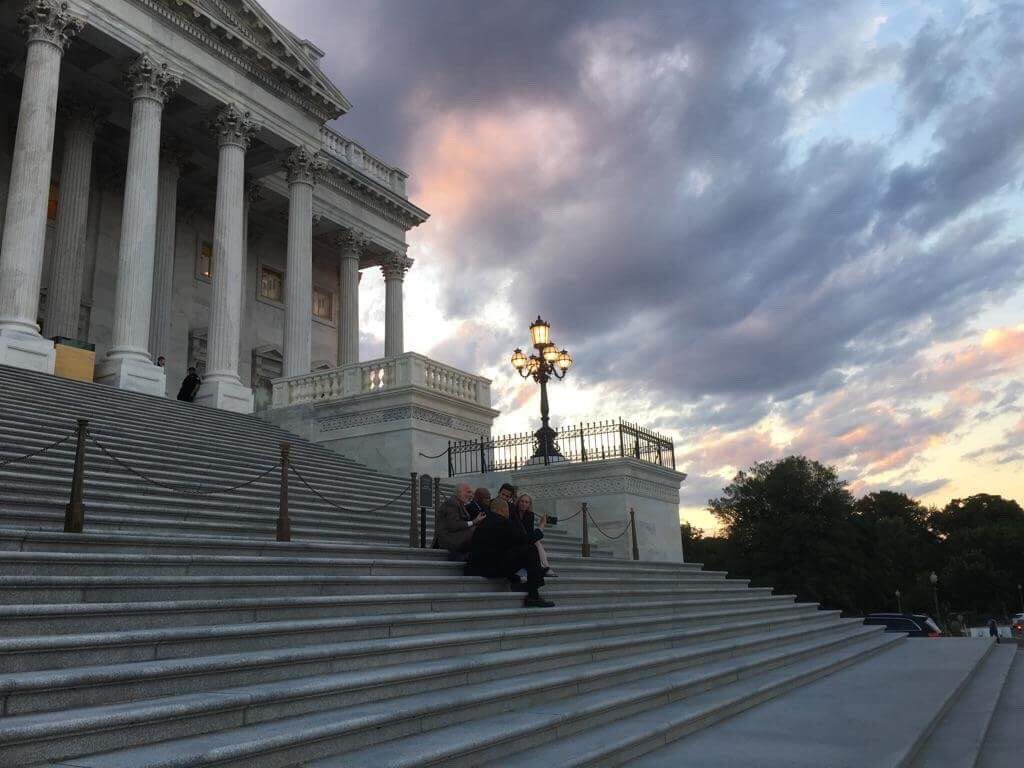
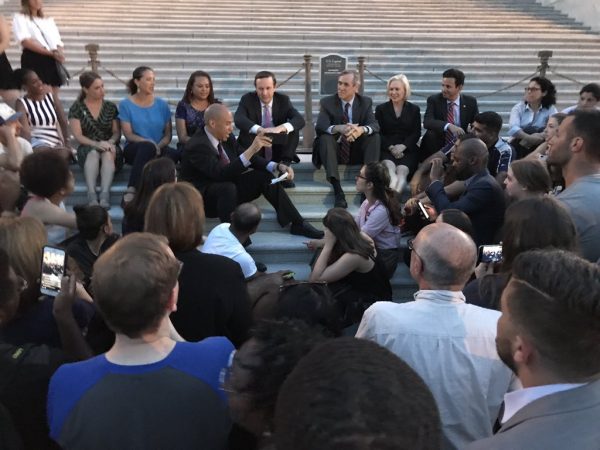
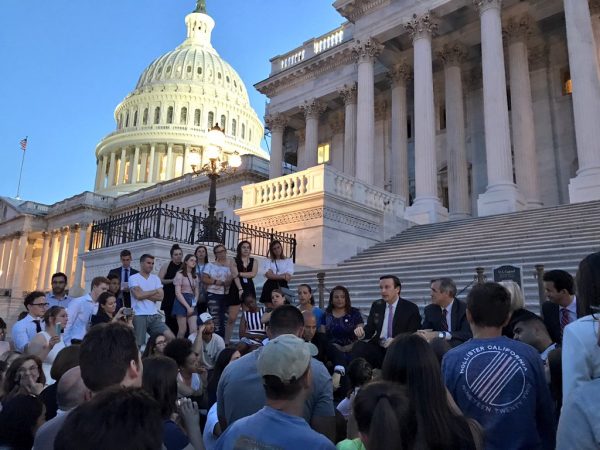
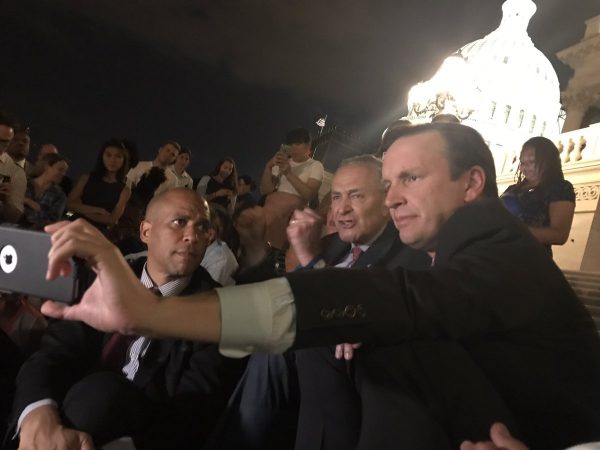 6.27 Great set of tweets sent by Ben Winkler. First Cory Booker and John Lewis met on the steps of the capitol and sat down and started to chat. Before long they were met Kirsten Gillibrand, Chris Murphy, Chuck Shumer, and many others. Democracy!
6.27 Great set of tweets sent by Ben Winkler. First Cory Booker and John Lewis met on the steps of the capitol and sat down and started to chat. Before long they were met Kirsten Gillibrand, Chris Murphy, Chuck Shumer, and many others. Democracy!
6.27 David Leonhardt in the Times: “I hope the senators will also take the time to ask themselves why virtually no health care expert supports the bill. Conservative health care experts have blasted it, along with liberal and moderate experts. The Congressional Budget Office says it will do terrible damage. Groups representing doctors, nurses, hospitals and retirees oppose the bill. So do advocates for the treatment of cancer, heart disease, lung disease, multiple sclerosis, cystic fibrosis and, yes, cerebral palsy.I hope the senators grasp the weight of the decision they face, for the country and for themselves. I hope the senators will watch a two-minute video created by doctors around the country. In it, each one looks into the camera and explains how the bill would damage medical care. “This bill would dramatically affect my patients,” said Dr. Gregory Lam of Circleville, Ohio, “and my ability to care for them.” It takes only three Republican senators to prevent millions of their fellow citizens from being harmed. Which of them has the courage to make the right choice over the easy one?
6.27 NY Post: “The European Union’s competition watchdog has slapped a record 2.42 billion euro ($2.72 billion) fine on internet giant Google for breaching antitrust rules with its online shopping service. European regulators said Tuesday that “Google has abused its market dominance as a search engine by giving an illegal advantage to another Google product, its comparison shopping service.”6.27 NY Post: Glitter boobs are the new beauty trend hitting festivals this summer,
6.27 NY Post: The image of the United States has deteriorated sharply across the globe under President Donald Trump and an overwhelming majority of people in other countries have no confidence in his ability to lead, a survey from the Pew Research Center showed. Five months into Trump’s presidency, the survey spanning 37 nations showed US favorability ratings in the rest of the world slumping to 49 percent from 64 percent at the end of Barack Obama’s eight years in the White House.
But the falls were far steeper in some of America’s closest allies, including US neighbors Mexico and Canada, and European partners like Germany and Spain.
6.26 A highly anticipated report from the Congressional Budget Office says the Senate Republican health-care bill (called the Better Care Reconciliation Act) would result in 22 million people losing their insurance over the next decade. That’s little improvement over the unpopular House version, though the bill’s deep spending cuts would reduce the deficit by $321 billion in the same period.
 6.26
6.26
6.26 Glitter boobs have become the summer’s hottest festival trend
6.26 Michele Moody-Adams, a professor of political philosophy and legal theory at Columbia University, speaking at the Aspen Ideas Festival: Ensuring continued peace and prosperity in the United States depends not only on our ability to restore trust in government and the officials who run it. It is just as critical “that we figure out how to reawaken a sense of solidarity with each other as citizens, and to revive the belief that solidarity is best expressed by a commitment to shared sacrifice and an openness to constructive compromise.” How to rebuild that sense of solidarity that has defined American life in moments of shared crisis, like World War II, and appears to have waned in more recent decades? “The sacrifices and compromises that matter are not just those associated with the demands of war or other national crises. We must learn, for instance, to relinquish resentments towards the ‘opposition’ when we lose out in a political contest and to refrain from smug self-righteousness when we win. We must encourage our political leaders to be open to constructive compromise when political consensus is out of reach. We must also be more willing to tolerate the public expression of attitudes with which we disagree, and we must accept that even the best-designed legal institutions and practices may yield decisions which many believe to be mistaken. Democratic cooperation will always produce what John Rawls called the “strains of commitment,” and our continued flourishing as a democracy depends upon a readiness to acknowledge and accept these strains. Moody-Adams added that “if we are to sustain the solidarity that encourages acceptance of the strains of democratic cooperation, we must learn to more fully appreciate those contexts in which our common humanity is more important than our differences,” for example, “by admitting that it is often possible to recognize and respect the moral integrity of others even when we disagree with them about matters of moral and political significance.” What’s more, we must remain open “to the possibility of empathizing with the concerns—and especially the suffering—of those whose experiences and values are different from ours. Contemporary life erects many barriers to respect and concern for our common humanity, but the future of our democracy demands that we learn how to transcend them.”
6.25 Unconfirmed revelation: Banksy is Robert Del Naja, the British artist, musician, and founding member of Massive Attack.
6.25 David Lieb of the AP: “The AP scrutinized the outcomes of all 435 U.S. House races and about 4,700 state House and Assembly seats up for election last year.”
“The analysis found four times as many states with Republican-skewed state House or Assembly districts than Democratic ones. Among the two dozen most populated states that determine the vast majority of Congress, there were nearly three times as many with Republican-tilted U.S. House districts.”
“Traditional battlegrounds such as Michigan, North Carolina, Pennsylvania, Wisconsin, Florida and Virginia were among those with significant Republican advantages in their U.S. or state House races. All had districts drawn by Republicans after the last Census in 2010.” “[E]ven if Democrats had turned out in larger numbers, their chances of substantial legislative gains were limited by gerrymandering.”
8.25 Peter Baker in the Times: “Trump asks fair question: What did Obama do about Russian meddling before election? Also fair question: What has Trump done about it since?”
6.25 Axios: “[V]oters’ complicated views of Trump may give Republicans more running room than his popularity figures suggest. The votes cast by individual Republican incumbents [like healthcare in the Senate this week] may be more important to their survival than any linkage with the president.”
6.23 Sam Baker in Axios: The 142-page Senate bill: It “would not replace the Affordable Care Act. It would replace Medicaid.” The biggest winners: young people who don’t use much health care — the “losers” under Obama’s Affordable Care Act. Those consumers would no longer face a penalty for going uninsured. They’d get bigger subsidies than they’re getting now. And the broader shifts in the healthcare market would favor people who don’t need to use it. The losers, broadly, are older consumers and the poor. Although the bill phases in its Medicaid cuts more slowly than its House counterpart, once they took effect, the Senate’s cuts would be deeper. And in the individual insurance market, older consumers would see their financial assistance shrink.
6.23 Margot Sanger-Katz in the Times: “Obamacare raised taxes on high earners and the health care industry, and essentially redistributed that income — in the form of health insurance or insurance subsidies — to many of the groups that have fared poorly over the last few decades. “The draft Senate bill … would jettison those taxes while reducing federal funding for the care of low-income Americans. The bill’s largest benefits go to the wealthiest Americans … and its biggest losses fall to poorer Americans who rely on government support.”
6.22 George Will in the Washington Post: “In the accelerated churning of today’s capitalism, changing tastes and expanding choices destroy some jobs and create others, with net gains in price and quality. But disruption is never restful, and the United States now faces a decision unique in its history: Is it tired — tired of the turmoil of creative destruction? If so, it had better be ready to do without creativity. And ready to stop being what it has always been: restless.”
6.22 “Representative Tim Ryan of Ohio, who tried to unseat Ms. Pelosi as House minority leader late last fall, said she remained a political millstone for Democrats. But Mr. Ryan said the Democratic brand had also become ‘toxic’ in much of the country because voters saw Democrats as ‘not being able to connect with the issues they care about.’ ‘Our brand is worse than Trump.'”
6.22 David von Drehle in Time: “It goes back to the Greeks, who understood that the peril of kings was hubris, and that hubris was an invitation to the avenging goddess called Nemesis. In Robert Mueller, Trump may have found his.”
6.21 Fast Company: Most leaders “vastly underestimate the power and necessity of positive reinforcement,” Jack Zenger and Joe Folkman, CEO and president of Zenger/Folkman, write in Harvard Business Review. An abundance of research shows that giving positive feedback increases employees’ sense that they’re learning and growing at their jobs, makes them feel valued, and leads to increased confidence and competence. A 2015 Gallup survey found that 67% of employees whose managers communicated their strengths were fully engaged in their work, as compared to 31% of employees whose managers only communicated their weaknesses. One study found that high-performing teams receive nearly six times more positive feedback than less effective teams—evidence that positive reinforcement really does help the bottom line.
6.21 The Atlantic: Subjects under the influence of power, [the UC Berkeley psychology professor Dacher Keltner] found in studies spanning two decades, acted as if they had suffered a traumatic brain injury—becoming more impulsive, less risk-aware, and, crucially, less adept at seeing things from other people’s point of view.
Sukhvinder Obhi, a neuroscientist at McMaster University, in Ontario, recently described something similar. Unlike Keltner, who studies behaviors, Obhi studies brains. And when he put the heads of the powerful and the not-so-powerful under a transcranial-magnetic-stimulation machine, he found that power, in fact, impairs a specific neural process, “mirroring,” that may be a cornerstone of empathy. Which gives a neurological basis to what Keltner has termed the “power paradox”: Once we have power, we lose some of the capacities we needed to gain it in the first place.
6.21 Wired: “Global cybersecurity analysts have a theory about the endgame of Ukraine’s hacking epidemic: They believe Russia is using the country as a cyberwar testing ground — a laboratory for perfecting new forms of global online combat.”
6.20 Republican Karen Handel beats Democrat Jon Ossoff 52-48 in a high-stakes special election in Georgia’s sixth district. In a race in South Carolina, a Republican narrowly beats the Democrat
Gregg Henry plays a Trumpian Julius Caesar in Shakespeare in the Park
6.19 Richard Reeves in The Guardian: “The upper middle class families have become greenhouses for the cultivation of human capital. Children raised in them are on a different track to ordinary Americans, right from the very beginning,” he writes.The upper middle class are “opportunity hoarding” – making it harder for others less economically privileged to rise to the top; a situation that Reeves says places stress on the efficiency of the US economic system and creates dynastic wealth and privilege of the kind the nation’s fathers sought to avoid. “The US labor market is mostly meritocratic and not some kind of medieval cartel,” Reeves told the Guardian, “but it’s what happens before that that is unfair.” The problem, he says, is that people enter the race with very different levels of preparation. “Kids from more affluent backgrounds are entering the contest massively well prepared, while kids from less affluent backgrounds are not. The well-prepared kids win, and everybody pretends to themselves it’s a meritocracy,” he says. Reeves believes we have to think much earlier about equality of opportunity, including the way the education system, labor and housing markets work. Without reform, society continues with a system that replicates inequality, he argues.
6.19 Mike Allen in Axios: “The Bannon wing of the White House would like to take on the lords of the Valley now over outsourcing, the concentration of wealth and their control over our dand lives. But this fight is on hold for a later date, officials tell us. The bigger problem for tech is that many Americans are rethinking their romantic views of the hottest and biggest companies of the new economy. As people look for villains to blame, tech might get its turn: Some shine has come off Facebook (though not in user data, Dan Primack points out: People still love the service), as executives fend off grievances about fake news, live violence and the filter bubble. Silicon Valley makes itself a juicy target with its male dominance, concentration of wealth (in both people and places), and reliance on foreign workers. Robots will soon be eating lots of jobs, with working-class, blue collar workers — an engine of the Trump coalition — at the most immediate risk. Many think this will be the story of the next 10 years. Anyone familiar with military intelligence will tell you cyber-risk is much greater than most people realize. Russians used cyber tools to try to throw the 2016, and electronic attack is perhaps the greatest U.S vulnerability to an international power. People increasingly distrust technology, and the companies will increasingly be in the crosshairs. Richard Edelman — president and CEO of the global communications firm — wrote in introducing Edelman’s 2017 Trust Barometer: “[O]ngoing globalization and technological change are now further weakening people’s trust in global institutions, which they believe have failed to protect them from the negative effects of these forces.
6.19 Recode: “Musk estimates the cost of getting 12 people to Mars to start a colony is about $10 billion per person at this point. … He thinks they might be able to get the cost down to less than $100,000.” Musk: “If we can get the cost of moving to Mars to be roughly equivalent to a median house price in the United States, which is around $200,000, then I think the probability of establishing a self-sustaining civilization is very high … I think it would almost certainly occur.'”
6.19 Steve Coll in The New Yorker: “The Constitution does appear to be alive and well: prosecutors and the F.B.I. have vigorously defended their independence; judges appointed by Presidents of both major parties have blocked the Administration’s discriminatory travel ban; and a robust and well-sourced Washington press corps is keeping the public apprised of the Administration’s activities.”
6.18 Megn Kelly‘s interview with Alex Jones a ratings bust
6.18 Dinner at Fig and Olive with Paul and Anne
6.17 Bret Stephens in the Times: “The United States has too many people who don’t work hard, don’t believe in God, don’t contribute much to society and don’t appreciate the greatness of the American system. They need to return whence they came. I speak of Americans whose families have been in this country for a few generations. Complacent, entitled and often shockingly ignorant on basic points of American law and history, they are the stagnant pool in which our national prospects risk drowning. On point after point, America’s nonimmigrants are failing our country. Crime? A study by the Cato Institute notes that nonimmigrants are incarcerated at nearly twice the rate of illegal immigrants, and at more than three times the rate of legal ones. Educational achievement? Just 17 percent of the finalists in the 2016 Intel Science Talent Search — often called the “Junior Nobel Prize” — were the children of United States-born parents. At the Rochester Institute of Technology, just 9.5 percent of graduate students in electrical engineering were nonimmigrants.”
6.17 Binge-watched the Canadian series Cardinal. Most excellent. Billy Campbell is terrific. So is his counterpart, the fetching Quebecoise actress Karine Vanasse.
6.16 Finished House of Cards Season 5. Too over the top.
6.14 House Majority Whip Steve Scalise was among five people shot during a Republican congressional baseball practice in Alexandria, Virginia, marking the first shooting that’s targeted a federal legislator in six years. President Trump praised Capitol Police officers for intervening in the attack and confirmed that the gunman, who law enforcement identified as 66-year-old James T. Hodgkinson, died of his injuries.
6.14 A Fire in London: At least 58 people were killed and dozens of others were left in critical condition after a fire broke out in western London’s Grenfell Tower, prompting fears that the 24-floor apartment building might collapse.
6.13 The Cabinet Praise-a-thon. “Chief of Staff Reince Priebus, taking his turn to genuflect for a beaming Trump, said: “On behalf of the entire senior staff around you, Mr. President, we thank you for the opportunity and the blessing that you’ve given us to serve your agenda and the American people.”
6.13 The Atlantic: The embattled Uber CEO Travis Kalanick announced he is taking a leave of absence for an unspecified amount of time following a string of scandals that have engulfed the ride-sharing app
6.12 Warriors top Cavaliers, 4 games to 1
6.11 Penguins beat Predators in 6 games
6.10 Robert Reich in The Guardian: “[Trump’s infrastructure plan] boils down to a giant public subsidy to developers and investors, who would receive generous tax credits in return for taking on the job. Which means the rest of us would have to pay higher taxes or get fewer services in order to make up for the taxes the developers and investors would no longer pay. For example (in one version of the plan I’ve come across), for every dollar developers put into a project, they’d actually pay only 18 cents – after tax credits – and taxpayers would contribute the other 82 cents through their tax dollars. No one should be surprised at this scheme. It’s what Trump knows best. After all, he was a developer who made billions, often off sweeteners such as generous tax credits and other subsidies. The public would also pay a second time. The developers would own the roads and bridges and other pieces of infrastructure they finance. They’d then charge members of the public tolls and fees to use them.”
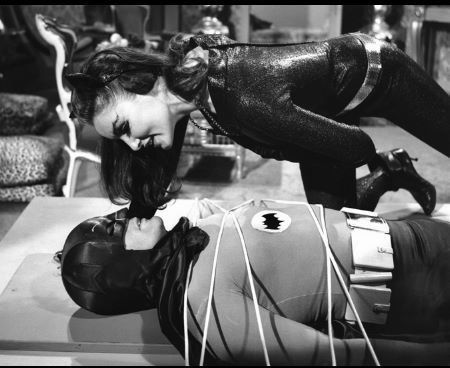 6.10 Adam West dies
6.10 Adam West dies
6.9 David French in National Review: “I don’t believe a civil-war mentality will save America. There are simply too many differences and too many profound disagreements for one side or the other to exercise true political dominance. Red won’t beat blue in the same way that blue beat gray. Adopt the civil-war mentality and you’ll only hasten a potential divorce. No, absent a presently unforeseen unifying ideology, event, or person, the idea that will save America is one of the oldest ideas of the Republic: federalism. So long as we protect the “privileges and immunities” of American citizenship, including all of the liberties enumerated in the Bill of Rights, let California be California and Texas be Texas. De-escalate national politics. Ideas that work in Massachusetts shouldn’t be crammed down the throats of culturally different Tennesseans. Indeed, as our sorting continues, our ability to persuade diminishes. (After all, how can we understand communities we don’t encounter?)”
6.9 GEOFFREY KABASERVICE in the Times: “Toxic polarization means that Congress is unlikely to pass any significant legislation on infrastructure and tax reform that once might have attracted cross-aisle support. Mr. Trump also lacks the popularity that allowed presidents like Ronald Reagan and Bill Clinton to rally the public behind their proposals and compel Congress to go along with them, and he doesn’t seem to understand that their skillful use of the reputable media was an integral part of their success.
Mr. Trump cast himself during the election as the sole candidate able to break through Washington gridlock and get things done. Will his failure as a problem solver cause his supporters to abandon him? I doubt it. Scratch a Trump supporter, and you’re likely to find someone deeply pessimistic about America and its future. Few believe that he will be able to bring back the good times (however they define them) because they’re convinced that the system is rigged: The “deep state” is too entrenched, the demographic tide too advanced and the global elite too powerful to allow real change. Still, they appreciate President Trump for fighting the fight, especially when it involves going against the wishes of his own party and the customary norms of presidential behavior. The Comey hearing, then, is unlikely to change their minds. Anything short of blatant evidence of illegality will simply play into their narrative of the president’s battles against his diabolical enemies. They will continue to see President Trump as the ultimate political independent, taking on the whole world. Even if it’s an empty performance, it’s bound to win applause.
6.9 More than 8,000 U.S. brick-and-mortar stores could close this year — twice the number as 2016, per Axios’ Steve LeVine. Among the chief victims are retail workers. Amazon says it’s adding 100,000 employees, but a multiple of that number have lost their jobs in recent years. One in 9 Americans work in bricks-and-mortar retail, almost 16 million people in all.
6.8 Hung Parliament. Teresa May‘s gamble fails, as conservatives lose majority.
6.8 Comey testifies; Trump claims vindication. “The reason this is such a big deal is, we have this big messy wonderful country where we fight with each other all the time. But nobody tells us what to think, what to fight about, what to vote for except other Americans. And that’s wonderful and often painful. But we’re talking about a foreign government that using technical intrusion, lots of other methods, tried to shape the way we think, we vote, we act. That is a big deal. And people need to recognize it. It’s not about Republicans or Democrats. They’re coming after America, which I hope we all love equally. They want to undermine our credibility in the face the world. They think that this great experiment of ours is a threat to them. So they’re going to try to run it down and dirty it up as much as possible. That’s what this is about and they will be back. Because we remain — as difficult as we can be with each other — we remain that shining city on the hill. And they don’t like it.”
6.8 Benjamin Wittes in lawfare.come: “this document is about a far more important question to the preservation of liberty in a society based on legal norms and rules: the abuse of the core functions of the presidency. It’s about whether we can trust the President—not the President in the abstract, but the particular embodiment of the presidency in the person of Donald J. Trump—to supervise the law enforcement apparatus of the United States in fashion consistent with his oath of office. I challenge anyone to read this document and come away with a confidently affirmative answer to that question.”
6.7 In anticipation of his testimony, James Comey releases his prepared remarks, which include details of his three private meetings and six private phone calls with Trump. Highlights:
January 27 Dinner: “. . . My instincts told me that the one-on-one setting, and the pretense that this was our first discussion about my position, meant the dinner was, at least in part, an effort to have me ask for my job and create some sort of patronage relationship. That concerned me greatly, given the FBI’s traditionally independent status in the executive branch. I replied that I loved my work and intended to stay and serve out my ten-year term as Director. And then, because the set-up made me uneasy, I added that I was not “reliable” in the way politicians use that word, but he could always count on me to tell him the truth. I added that I was not on anybody’s side politically and could not be counted on in the traditional political sense, a stance I said was in his best interest as the President. A few moments later, the President said, “I need loyalty, I expect loyalty.” I didn’t move, speak, or change my facial expression in any way during the awkward silence that followed. We simply looked at each other in silence. The conversation then moved on, . . .Near the end of our dinner, the President returned to the subject of my job, saying he was very glad I wanted to stay, adding that he had heard great things 4 about me from Jim Mattis, Jeff Sessions, and many others. He then said, “I need loyalty.” I replied, “You will always get honesty from me.” He paused and then said, “That’s what I want, honest loyalty.” I paused, and then said, “You will get that from me.” As I wrote in the memo I created immediately after the dinner, it is possible we understood the phrase “honest loyalty” differently, but I decided it wouldn’t be productive to push it further. The term – honest loyalty – had helped end a very awkward conversation.”
February 14 Oval Office Meeting On February 14, I went to the Oval Office for a scheduled counterterrorism briefing. . . . The President signaled the end of the briefing by thanking the group and telling them all that he wanted to speak to me alone. I stayed in my chair. As the participants started to leave the Oval Office, the Attorney General lingered by my chair, but the President thanked him and said he wanted to speak only with me. The last person to leave was Jared Kushner, who also stood by my chair and exchanged pleasantries with me. The President then excused him, saying he wanted to speak with me. When the door by the grandfather clock closed, and we were alone, the President began by saying, “I want to talk about Mike Flynn.” Flynn had resigned 5 the previous day. The President began by saying Flynn hadn’t done anything wrong in speaking with the Russians, but he had to let him go because he had misled the Vice President.. . .“He is a good guy and has been through a lot.” He repeated that Flynn hadn’t done anything wrong on his calls with the Russians, but had misled the Vice President. He then said, “I hope you can see your way clear to letting this go, to letting Flynn go. He is a good guy. I hope you can let this go.” I replied only that “he is a good guy.”. . . Shortly afterwards, I spoke with Attorney General Sessions in person to pass along the President’s concerns about leaks. I took the opportunity to implore the Attorney General to prevent any future direct communication between the President and me. I told the AG that what had just happened – him being asked to leave while the FBI Director, who reports to the AG, remained behind – was inappropriate and should never happen. He did not reply.
March 30 Phone Call On the morning of March 30, the President called me at the FBI. He described the Russia investigation as “a cloud” that was impairing his ability to act on behalf of the country. He said he had nothing to do with Russia, had not been involved with hookers in Russia, and had always assumed he was being recorded when in Russia. He asked what we could do to “lift the cloud.” I responded that we were investigating the matter as quickly as we could, . . . .The President went on to say that if there were some “satellite” associates of his who did something wrong, it would be good to find that out, but that he hadn’t done anything wrong and hoped I would find a way to get it out that we weren’t investigating him. I
April 11 Phone Call On the morning of April 11, the President called me and asked what I had done about his request that I “get out” that he is not personally under investigation. I replied that I had passed his request to the Acting Deputy Attorney General, but I had not heard back. He replied that “the cloud” was getting in the way of his ability to do his job. He said that perhaps he would have his people reach out to the Acting Deputy Attorney General. I said that was the way his request should be handled. I said the White House Counsel should contact the leadership of DOJ to make the request, which was the traditional channel. He said he would do that and added, “Because I have been very loyal to you, very loyal; we had that thing you know.” I did not reply or ask him what he meant by “that thing.” I said only that the way to handle it was to have the White House Counsel call the Acting Deputy Attorney General. He said that was what he would do and the call ended. That was the last time I spoke with President Trump.
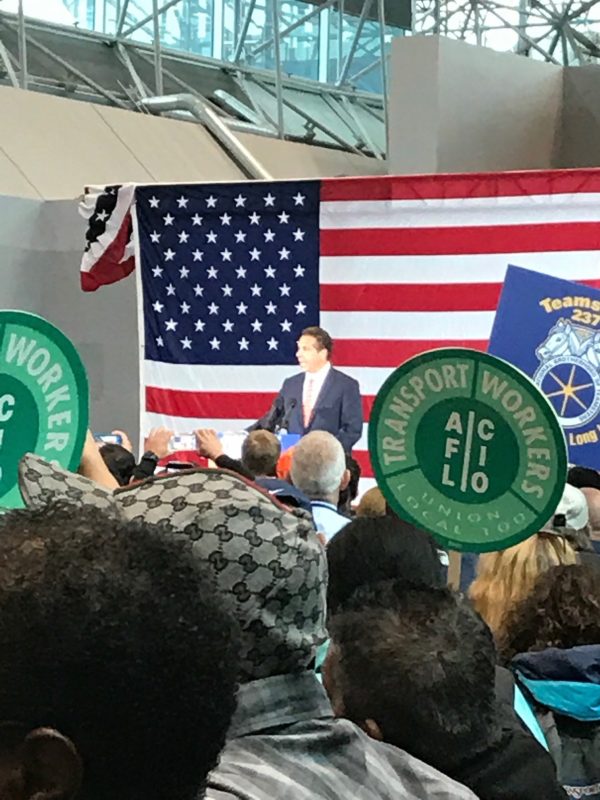
6.6 New York Fights Back rally at the Javits Center. “We believe that we are all connected, that there’s a cord that connects me to you, to you, to you, to you,” Cuomo said, pointing to people in the audience. “And that cord weaves a fabric and we call that fabric called community. And when one of us is raised, we’re all raised, and when one of us is all lowered, we are all lowered. We believe the New York credo that we are not at our best until every man, woman and child has the right to develop their God-given gifts and to contribute to society.”
6.6 Scooter Gennett of the Reds hit four home runs in four at bats in a game against the .St. Louis Cardinals.
6.6 Canadian Foreign Minister Chrystia Freeland : The United States has truly been the indispensable nation, Mr. Speaker. For their unique, seven-decades-long contribution to our shared peace and prosperity, and on behalf of all Canadians, I would like to profoundly thank our American friends.
As I have argued, Canada believes strongly that this stable, predictable international order has been deeply in our national interest. And we believe it has helped foster peace and prosperity for our southern neighbours, too. Yet it would be naive or hypocritical to claim before this House that all Americans today agree. Indeed, many of the voters in last year’s presidential election cast their ballots, animated in part by a desire to shrug off the burden of world leadership. To say this is not controversial: it is simply a fact.
Canada is grateful, and will always be grateful, to our neighbour for the outsized role it has played in the world. And we seek and will continue to seek to persuade our friends that their continued international leadership is very much in their national interest—as well as that of the rest of the free world. Yet we also recognize that this is ultimately not our decision to make. It is a choice Americans must make for themselves. The fact that our friend and ally has come to question the very worth of its mantle of global leadership, puts into sharper focus the need for the rest of us to set our own clear and sovereign course. For Canada that course must be the renewal, indeed the strengthening, of the postwar multilateral order.
We will follow this path, with open hands and open hearts extended to our American friends, seeking to make common cause as we have so often in the past. And indeed, as we continue to do now on multiple fronts—from border security, to the defence of North America through NORAD, to the fight against Daesh, to our efforts within NATO, to nurturing and improving our trading relationship, which is the strongest in the world. And, at the same time, we will work with other like-minded people and countries who share our aims.
6.5 Reality Leigh Winner, a 25-year-old NSA contractor and Air Force veteran, was arrested and charged with leaking classified information to a news organization.
6.5 Trump doubled down on his criticism of London Mayor Sadiq Khan. “Pathetic excuse by London Mayor Sadiq Khan who had to think fast on his “no reason to be alarmed” statement. MSM is working hard to sell it!
6.5 Albany
6.4 Maureen Dowd in the Times: “America is living through a fractured fairy tale, in the grip of a lonely and uninformed mad king, an arrogant and naïve princeling, a comely but complicit blond princess and a dyspeptic, dystopian troll under the bridge. American carnage, indeed. On climate change, the troll, Steve Bannon, got control and persuaded Donald Trump to give a raspberry to the world. Bannon had better watch out or rising waters will wash out his bridge to the past. Even though Jared, Ivanka, Gary Cohn, Rex Tillerson, Elon Musk, Bob Iger and Lloyd Blankfein pressed the president to stay in the Paris climate accord — which is merely aspirational about the inhalational — Bannon won the day because Trump loves to act like the fired Mr. Met.”

6.3 Saw Wonder Woman with Ginny, Cara, Molly and Shawn. Excellent. Gal Gadot is a star.
6.3 Roy Larner, 47, is a lifelong Millwall supporter and was in a steakhouse near London Bridge when three knife-wielding attackers barged in and began slashing diners.
“They had these long knives and started shouting about Allah. Then it was, ‘Islam, Islam, Islam,’” Larner told The Sun. “Like an idiot I shouted back at them. I thought, ‘I need to take the p— out of these b—ers.’” Before he actually stepped into the path of the attackers, Larner made sure they knew he was affiliated with the notoriously rough and tumble South London club.
“I took a few steps towards them and said, ‘F– you, I’m Millwall.’ So they started attacking me,” Larner told The Sun. Larner was left with eight knife wounds on his head, neck, chest and hands, but his actions allowed dozens of his fellow diners to rush out of the building. He is being hailed as The Lion of London Bridge, a reference to the Millwall mascot.
6.3 Seven murdered in knife-and-vehicle terrorist attack in London,
6.3 Gideon Lichfield in Quartz: “Chinese firms will dominate the alternatives, while enjoying the most clout in setting global energy policies. What’s at stake isn’t just opportunities in the cleantech industry (solar already employs more than twice as many Americans as coal). It’s a world in which China stands to become not only the biggest economy within a decade or so, but, eventually, an energy superpower. Its growing military muscle and wide-ranging global investments in infrastructure will add to its influence, and its pro-globalization (and now pro-climate) stance will even lend China a grudging moral authority with the world’s other rich nations. This is an entirely new geopolitical order—one in which, unless Europe overcomes its splits, an opaque autocracy will be the chief agenda-setter. Because of its size and weapons, the US, like Russia, will never not be a superpower. But, like Russia, it is on its way to becoming a second-tier one. China will take the throne. And Trump, for all his complaints about China’s ambitions, has just dusted off the cushions and invited it to have a seat.”
6.2 Bill Maher: “Senator, I am a house nigger.”
6.2 Ireland’s ruling party has elected a new prime minister, and the results are historic: Not only will 38-year-old Leo Varadkar be the youngest leader in Ireland’s history, he’ll also be its first prime minister who’s openly gay and its first who’s a person of color.
6.2 David Brooks in the Times: “In this worldview, morality has nothing to do with anything. Altruism, trust, cooperation and virtue are unaffordable luxuries in the struggle of all against all. Everything is about self-interest. We’ve seen this philosophy before, of course. Powerful, selfish people have always adopted this dirty-minded realism to justify their own selfishness. The problem is that this philosophy is based on an error about human beings and it leads to self-destructive behavior in all cases. The error is that it misunderstands what drives human action. Of course people are driven by selfish motivations — for individual status, wealth and power. But they are also motivated by another set of drives — for solidarity, love and moral fulfillment — that are equally and sometimes more powerful. People are wired to cooperate. Far from being a flimsy thing, the desire for cooperation is the primary human evolutionary advantage we have over the other animals. People have a moral sense.”
June 2 Michael Grunwald in Politico: “Trump’s abrupt withdrawal from this carefully crafted multilateral compromise was a diplomatic and political slap: It was about extending a middle finger to the world, while reminding his base that he shares its resentments of fancy-pants elites and smarty-pants scientists and tree-hugging squishes who look down on real Americans who drill for oil and dig for coal. He was thrusting the United States into the role of global renegade, rejecting not only the scientific consensus about climate but the international consensus for action, joining only Syria and Nicaragua (which wanted an even greener deal) in refusing to help the community of nations address a planetary problem. Congress doesn’t seem willing to pay for Trump’s border wall—and Mexico certainly isn’t—so rejecting the Paris deal was an easier way to express his Fortress America themes without having to pass legislation.”

6.2 Joe Scarborough: “Donald Trump doesn’t know anything about policy. Donald Trump doesn’t know anything about politics. Donald Trump doesn’t know anything about anything. He can get up and give a good speech. You listen to him talk about any topic and he wanders from sentence to sentence to sentence. So Steve Bannon is now the President of the United States. And that was more clear yesterday than ever before.”
6.1 Megan Garber on Wonder Woman in The Atlantic: “The character suits the times … not just because of the fights she fights, but also because of one of the weapons she uses to fight them: the Lariat of Hestia, otherwise known as the Golden Lasso, otherwise known as the Lasso of Truth. The device was forged of the chain mail worn by Diana’s mother, the warrior queen; if someone finds themselves ensnared within the lasso’s golden grip—as Steve learns in the new Wonder Woman—that person will be compelled to tell the truth. The lasso features prominently in the director Patty Jenkins’s film, as both a weapon and a tactic: In it, Diana uses the glimmering device repeatedly to whip, to entrap, to win. Most of all, though, she uses it for precisely the purpose its name suggests: to force people, usually against their will, to admit to reality.”
6.1 NY Times: “Asked about suspicions that Russia might try to interfere in the coming elections in Germany, Mr. Putin raised the possibility of attacks on foreign votes by what he portrayed as free-spirited Russian patriots. Hackers, he said, “are like artists” who choose their targets depending how they feel “when they wake up in the morning.” Any such attacks, he added, could not alter the result of elections in Europe, America or elsewhere. Artists, he said, paint if they wake up feeling in good spirits while hackers respond if “they wake up and read that something is going on in interstate relations” that prompts them to take action. “If they are patriotically minded, they start making their contributions — which are right, from their point of view — to the fight against those who say bad things about Russia,” Mr. Putin added, apparently referring to Hillary Clinton.”
6.1 Kathy Griffin holds up severed head of Trump, gets fired from CNN.
6.1 Eric Roston in Bloomberg Businessweek: “An exit would undermine America’s economic competitiveness, technological innovation, and global leadership. Not to mention the, um, planet.”
6.1 Goldman Sachs CEO Lloyd Blankfein: “Today’s decision is a setback for the environment and for the U.S.’s leadership position in the world.” Disney Chairman and CEO Robert Iger tweets: “As a matter of principle, I’ve resigned from the President’s Council.” Tesla CEO Elon Musk tweets: “Am departing presidential councils. Climate change is real. Leaving Paris is not good for America or the world.”
6.1 Fareed Zakaria on CNN: “This will be the day that the United States resigned as the leader of the free world.”
June 1: President Trump withdrew the US from the Paris Accords. He claimed that stipulations in the agreement were unfair to the US saying, “The Paris Accord is very unfair at the highest level to the United States.” He pointed to rules regarding coal production as being particularly disagreeable. “This agreement is less about the climate and more about others gaining financial advantage over the US,” he said.
June 1 New York Post: “Couples trying for a baby have sex an average of 78 times before becoming pregnant, a new study reveals. Typically, it takes a total of 185 days from deciding to conceive to getting a positive pregnancy test — the equivalent of six months and three days. It also emerged couples have sex 13 times each month while attempting to make a baby.”

